Introduction
Welcome to the Health Detective Podcast by Functional Diagnostic Nutrition. Today we will be discussing many things including body image mindset, business tips, and the reversing of Hashimoto’s and digestive issues.
[00:00:00] Detective Ev: All right. Hello there, Sarah. Welcome to the Health Detective Podcast. How are you?
[00:00:03] Sarah Baker: Thank you so much for having me. I’m super pumped and excited to be speaking with you today, Evan.
[00:00:08] Detective Ev: Yeah, and this is really cool. We will talk about this specific part later in the podcast. You’re an interesting person cause you actually have a decent long experience in history in this space already, and then are still choosing to go through the FDN program. I’m excited to talk about what led you to doing that. We’ll get to that later.
I always start off really similarly on this show, and any regular listener already knows that. I love to dive into the person’s health journey and story if they have one, and 99% of the people in our space do have one. Of course, I checked out your website and stuff, so I already know some of it, but it’ll be interesting to kind of dive deeper into this. What health symptoms were you experiencing and when did they start in your life?
[00:00:51] Sarah Baker: I actually have a few different healing journeys that I’ve gone through.

I started my practice 10 years ago. My initial healing journey was way back when I was a young little pup. Before I worked within the wellness space, I was in the fashion industry.
Hashimoto’s and Digestive Issues: Switching Careers
I was an international model and had a completely horrible lifestyle. I smoked cigarettes, a pack of day to try to maintain a certain weight and look a certain way. Even though the fashion world is very superficial, I ate horribly. I just did not live well, did not treat myself well.
The industry that I was in was very superficial, very cutthroat, very fake. Nobody treated themselves well. We didn’t treat each other very well. I was actually living in Turkey and Istanbul at the time.
I remember I was at a casting, and I was looking around the room. All the models were talking about what they were or were not going to eat that day to maintain a certain weight. Everybody was looking at each other as competition and everybody was gazing at each other like we were a threat to one another. It was just a vibe and an emotion that you do not want to immerse yourself in when you feel like you are reduced to looks and nothing else.

I was doing that for a good 13 years; I started when I was a child. I decided one day I’ve had enough, and I wanted to switch careers where I could help empower women to feel good about themselves, to love themselves, treat themselves well, nourish themselves, and to support one another.
That was my initial initiation into the health space. But most recently is when I experienced, I guess I would say, my biggest health crisis. Of course, I got pregnant two weeks before COVID officially started, back in March of 2020, is when things went down.
[00:02:42] Detective Ev: Almost three years now. Isn’t that insane?
[00:02:44] Sarah Baker: Wild.
Hashimoto’s and Digestive Issues: A Huge Cascade of Symptoms
I couldn’t, of course, go to the gym or do the things that I wanted to do while I was pregnant. We moved to the suburbs from where we were living in the city of Chicago at the time, just two weeks after I gave birth. That is when things went south.
So, prior to having my child, my second baby, and when I started my practice 10 years ago, as you could imagine, I am a very health-conscious person. I helped mitigate all my health challenges I had 10 years ago and was on the straight and narrow. This just goes to show you that it’s not always lifestyle induced when you have a health issue. It could be something in your environment or a virus that is dormant and pops back up.
For my second kind of health crisis, it was a combination of my environment. I found out the house we moved into had a mold issue, which caused a lot of complications and symptoms that I was experiencing. My child was not sleeping well, so I was waking up every 30 minutes throughout the night. I literally felt like I was dying, that’s how bad the sleep deprivation was. Also, I had postpartum anxiety.

My husband loves to blame the fact that on my first pregnancy I took placenta pills to remineralize and renourish myself, and this second time around our doula lost them in the mail. I was devastated cause I didn’t get the re-nourishment after I gave birth. So, there was a lot of different factors that kind of triggered a huge cascade of symptoms.
Hashimoto’s and Digestive Issues: A Diagnosis
I had an Epstein-Barr reactivation, which I never even knew I had before. So, I could have been dormant since childhood and creeped back up. I had everything from digestive issues like SIBO, candida, then had mold toxicity that I later uncovered.
Also, I had bad neurological issues. My eyesight started going wonky. When I typically would have 20/20 vision, things would get very blurry, straight lines would get squiggly, very strange symptoms neurologically. Even after my baby started sleeping, I was still waking up throughout the night, multiple times a night. My sleep was just wrecked. I felt fatigued, I had brain fog.
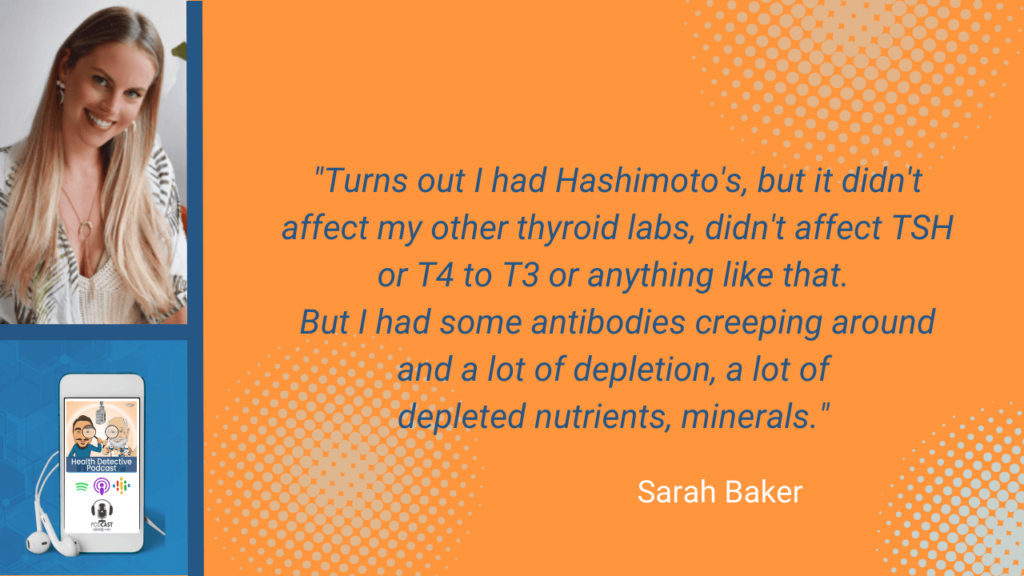
I wasn’t getting answers from my midwife. They ran their traditional blood tests. I work with a functional medicine doctor who now is one of my colleagues, and she ran way in-depth panels. Turns out I had Hashimoto’s, but it didn’t affect my other thyroid labs, didn’t affect TSH or T4 to T3 or anything like that. But I had some antibodies creeping around and a lot of depletion, a lot of depleted nutrients, minerals.
I was pretty much postmenopausal, but not technically postmenopausal. My estrogen, progesterone, all my hormones were rock bottom, and my mitochondria health was rock bottom. I had toxicities that showed up. Literally everything was wrong within my body. It was a consequence of a perfect storm, lack of sleep, giving birth, moving into a home that had mold. It’s just a combination of my circumstances in the environment, even though I was eating well, still, to the best of my ability.
Sometimes that’s not enough. There are circumstances that are out of your control, which is why working with somebody like an FDNP, this is why we’re health detectives, you can uncover what could be potentially infiltrating your system.
Hashimoto’s and Digestive Issues: Body Image Battles
[00:06:20] Detective Ev: I don’t want to throw you off with anything, but I want to go back, if I may, to the whole modeling thing.
Again, we have a largely woman audience and this is not something that’s that uncommon. It might not be modeling specifically, but this whole idea of the body image thing, this is unhealthy for people, man, like it really affects them. I mean this in a serious way, I don’t have an opinion on this. So, I’m coming from a place of actual ignorance.
I always hear, especially in my generation, I don’t know if you hear this, but in my generation, I hear all the time about a lot of the blame goes to some supposed male out there that wants a woman to look a certain way. Now, I fully admit that I have my biological desires that lead me towards a certain woman.
My girlfriend to me is very attractive, right? I always felt like that goes both ways, obviously. Like when I look at certain magazines, it’s a jacked-up dude that has a really nice jawline, super handsome, great eyes. I could say the same exact thing about that. Everyone has their own individual things.

But what I thought was so interesting about what you just described, and I know it’s a health show, but I wanted to touch on this. I feel like this is a mental health aspect. You described this like viciousness going against each other amongst women. That had nothing to do with the males. I’m sure there is a part of that, but I’m saying that was like women going against women. How does someone end up in that position where now you’re like competing with other women? What do you think brings people there?
Hashimoto’s and Digestive Issues: Basic Need for Validation
Are they looking for validation to begin with? Which, by the way, I’ve looked for in many ways myself, so this isn’t to put Sarah on the spot. But are people looking for validation or how do they get into that to begin with, if I may ask?
[00:07:46] Sarah Baker: How do they get into the modeling industry?
[00:07:48] Detective Ev: Yeah, like how did they get there? Because it sounds like it was terrible. It sounds like you guys are all unhealthy and everyone’s fighting each other, like that doesn’t sound fun.
[00:07:54] Sarah Baker: It’s really terrible. Yeah. I wish I could write a book to expose the modeling industry, but I can’t, of course, at this point. Maybe I could, but too much work.
Well, you know when, you are a little girl you love to play dress up, you love to look in the mirror, put clothes on, pose, and take photos. And when people tell you, oh my gosh, you’re so beautiful, obviously, that gives you a huge dopamine boost. That builds your confidence, that makes you feel validated, that makes you feel wanted. Then you want more of that.
It starts when you’re a child, essentially, when you’re a teenager or even a pre-teen. When you get that validation, you want more of that. So, a lot of little girls’ dreams is, I want to be a supermodel, I want to be a singer, I want to be an actress.
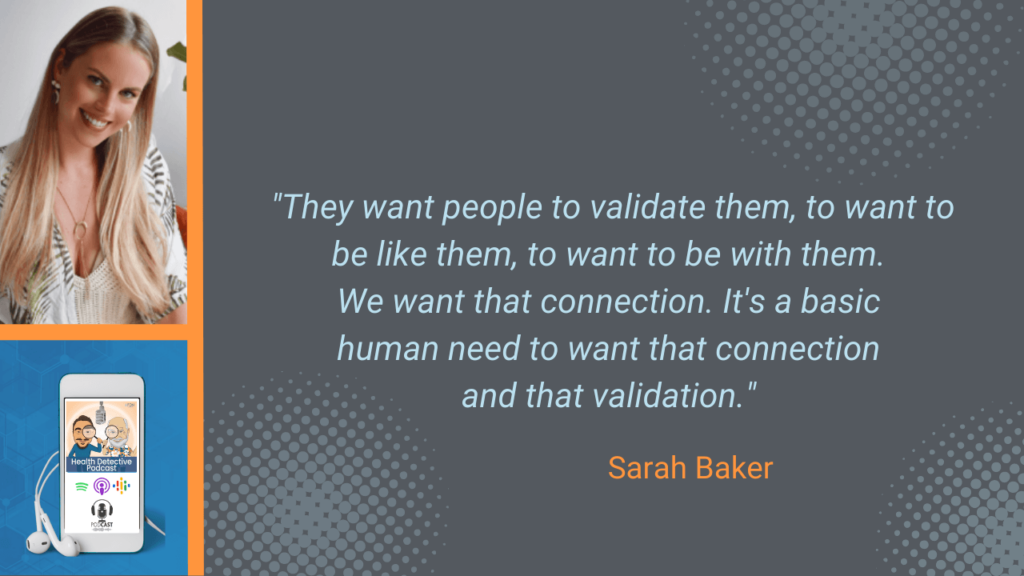
They want to have that validation. They want people to validate them, to want to be like them, to want to be with them. We want that connection. It’s a basic human need to want that connection and that validation. That’s how it started for me when I was a little girl.
Hashimoto’s and Digestive Issues: Worth Based on Appearance
My neighbor went to some modeling school, and they were talking about it, and I said, wow, I want to do that too. I want to play dress up and take photos and feel beautiful. At the end of the day, it’s all about a feeling. You want to feel wanted, beautiful, worthy, right? So, you find this whole industry that feeds that.
When you get selected for a job, you feel that emotion of, I am worthy because I was selected. Then when you don’t get that job, you feel like I am unworthy. I don’t look right. What is wrong with me? They didn’t choose me.
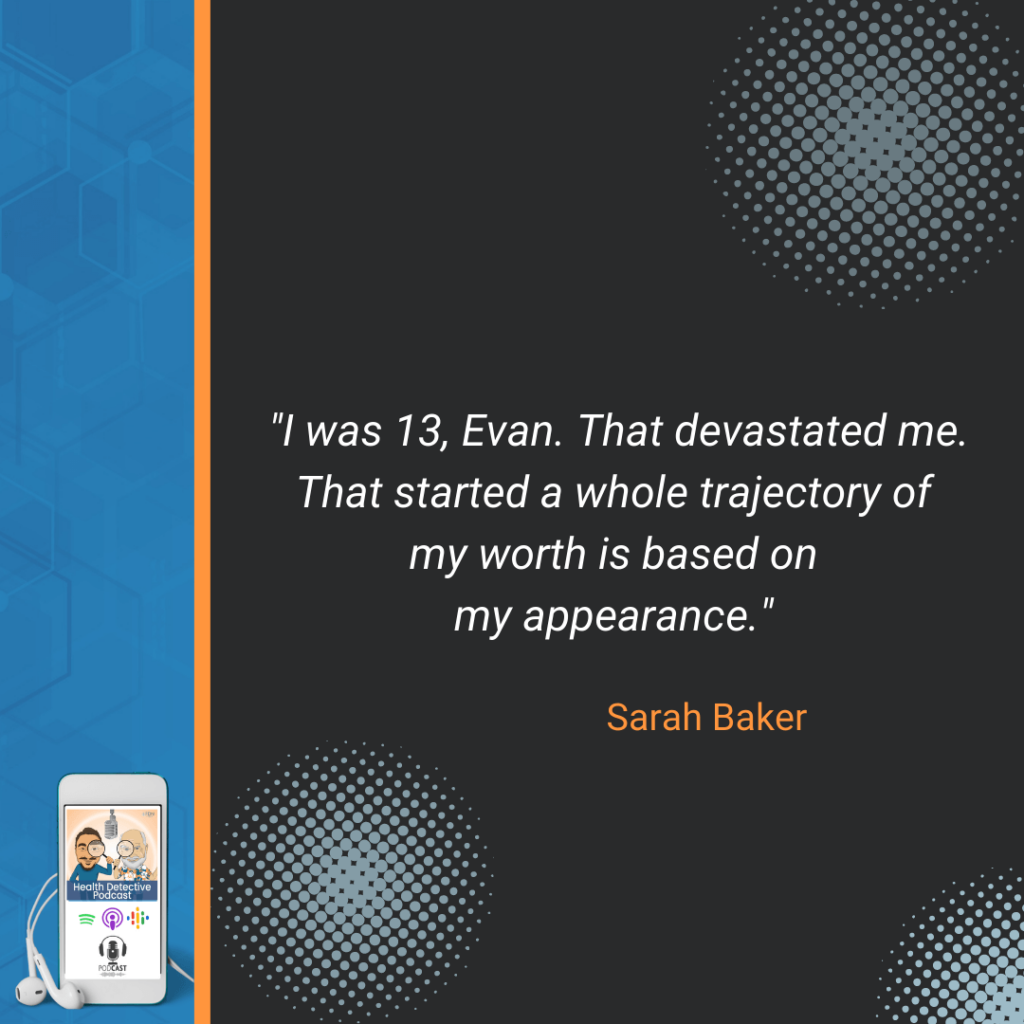
So, me as a teenager, when I would go to these agencies, I was 13 years old. I remember this so vividly. I went to a modeling agency to be represented; I went to an open call. They told me, you know what, you just need to do some more Pilates to slim down your thighs and then come back to us after you’ve done that. I was 13, Evan. That devastated me. That started a whole trajectory of my worth is based on my appearance.
I lived in Milan, I modeled in Milan, I modeled in Greece, I modeled in Turkey, I modeled in Miami, like all over the place. When you get that validation, you want more of it. Because one side of the industry is very glamorous, where you meet a lot of cool people, you do a lot of cool things. You can travel the world, and people are validating that need to nurture your inner confidence, right? Of course, everybody at the end of the day wants to look in the mirror and think that they look beautiful.
Hashimoto’s and Digestive Issues: Self-Esteem & Body Dysmorphia
So, when you’re in an industry that directly gives you that validation, you’re beautiful or nope, you’re not good enough, that is such a huge mental mind f right? What seems like it’s a beautiful, cool, awesome industry, quickly turns into an extremely mentally degrading, exhaustive, and depleting industry because there is more rejection than there is acceptance.
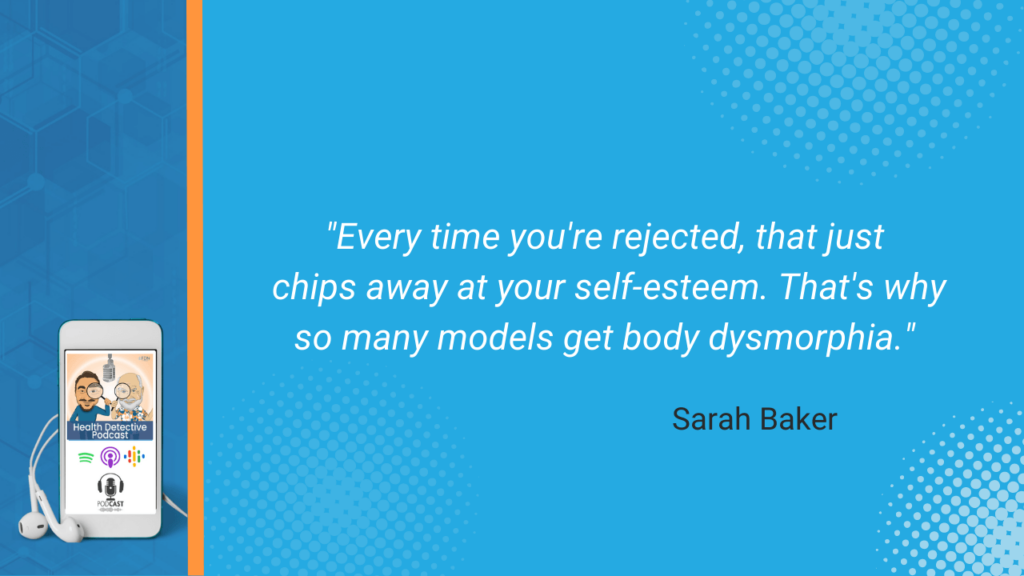
Every time you’re rejected, that just chips away at your self-esteem. That’s why so many models get body dysmorphia. Then what is resulted in all these magazines, all these photoshopped images, and all these size zero women is what all these little girls are seeing. That is continuing to condition that belief into women from the age of childhood, essentially, of this is what beauty is. If you don’t look like this, you gotta figure out a way to look like this. Otherwise, you’re not going to be validated in this world. It’s a vicious cycle.
That also is what feeds to all the models within the industry essentially working against each other or viewing each other as a threat because you’re literally everybody’s competition. When I would go to casting calls or auditions and the commercial, for example, was looking for a 5′ 9″ blonde female. It was all me and other five-foot nine blonde females, we’d all be sitting like, Hmm. That’s just not my vibe. I am a very approachable person. I want to be in an environment that feels inclusive, positive, uplifting, inspiring, and it was turning out to be the complete opposite.
On top of that, you are literally doing whatever you can to drop two inches in like a week to fit a certain guideline. It’s just extremely intense and it is not what people think it is.
Hashimoto’s and Digestive Issues: Degrading Comments
Of course, I will say nowadays the industry has changed tremendously where there’s a lot more body positivity. There’s a lot more models out there that are in all shapes and sizes. Where if I would’ve reentered the industry now, I’m pretty sure it would be a completely different experience than it was maybe like seven or eight years ago.
[00:12:50] Detective Ev: Gotcha. Well, first of all, thank you so much for answering that for me. I’m glad I asked and I’m glad that you’re willing to go there. Because again, even if it’s not the main focus of the show today, that’s fine. That answer’s going to resonate with someone out there. I would bet a lot of money on that.
It’s unbelievable to me the comment that was made to you at 13. I don’t mean that so literally. I actually do believe it because my friend Anna, she’s actually been on the show. She was on way back, like episode 93. But Anna did dance when she was younger.
Now Anna is a fully grown woman that is small. She’s like 5′ 2″. I stand like a foot taller than her basically. As an adult, no one in their life would say, oh, this is a large person. You would actually say the opposite, this is a small person. She said when she was doing ballet, when she was a kid, like the dance instructor told her like, her shoulders were too broad.
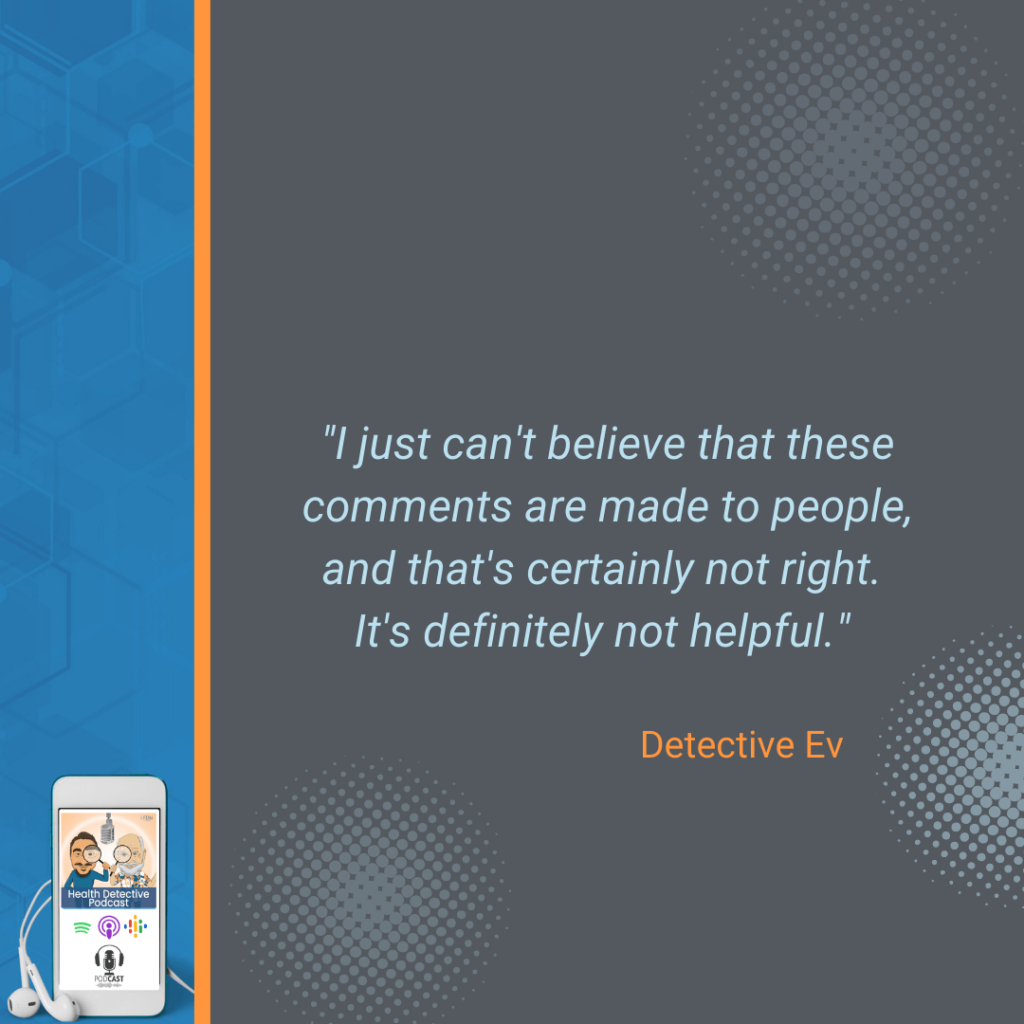
I’m like, well, who are you comparing yourself to? I’m just like, you’re already tiny. I just can’t believe that these comments are made to people, and that’s certainly not right. It’s definitely not helpful.
Hashimoto’s and Digestive Issues: Keeping It All in Line
I see what you’re saying with the modeling thing. I think there’s a very small subset that gets over glamorized, that’s not actually the point of this. Clearly, they’re doing the modeling thing where sometimes they’re promoting people that are unhealthy. The extreme is there. I believe just like we shouldn’t promote those extremes, we should not promote anorexic extremes either. That’s just what makes headlines.
What they’re actually trying to do is what you’re talking about, a happy medium and actually shows what a realistic woman looks like, what most men look like; they’re trying to do that. If you’re healthy and it’s realistic, I think that’s a great thing. I think that can help people. Especially in the age of social media, I mean, this kills all of us, right?
I can go online all day and just thank God I’m not a three outta 10. I’m certainly not a 10 outta 10 either. I could spend the rest of my life on this phone comparing myself to other people who look better than me or have bigger muscles or a thicker beard or whatever it might be, right? We can all play that game and it’s never ending. Because if the best-looking person, gosh forbid you happen to be that person in the world, congratulations, you know that’s not going to last. It goes away as you age. Then it’s like this constant thing.
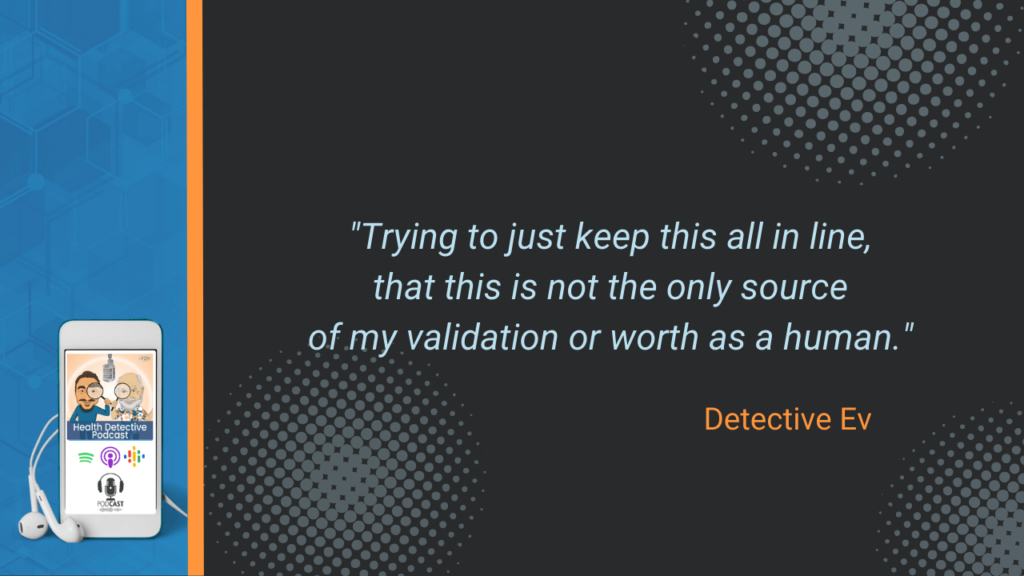
It’s okay to be fit, it’s okay to be healthy. I think we all do things to try to make ourselves look better, but it’s that balanced perspective, right? Trying to just keep this all in line, that this is not the only source of my validation or worth as a human. I think that’s really what this is, right?
Hashimoto’s and Digestive Issues: A Healthy & Vibrant Person
[00:14:58] Sarah Baker: Definitely 100%. And it bleeds over into the influencer and the fitness and health influencer world as well.
You see all these little 20-year-old fitness and health influencers touting their lifestyle and people are like, why can’t I look like that? It’s like, hello? When you were 20 years old, you probably looked pretty similar if you had a decent metabolism, right? Come back to me when you’re 30 and you’re still within the health and wellness space, and let’s see how you have changed and what you’ve changed with your approach and your protocol. Just saying. I had to get that out there.
[00:15:30] Detective Ev: Yeah. For most of us, listen, we’re not going to be the top tier, 10 outta 10. I think the best thing that we can do, and I mean this, the healthier I’ve gotten, the better that I look. So, you can actually do this in a lot of different ways.
I know we don’t know each other. I had like severe cystic acne, right? Getting healthy, like actually doing the right thing that I was supposed to do anyway led to me becoming a more attractive person. I think that’s the way to do it, and I think it’s the way to do it long term.

Reed Davis, the founder of FDN, he either is 70 or is about to turn 70, and this guy looks fantastic. Is he a 10 outta 10 model? No, I don’t think Reed’s at that level. But there’s something to be said about the longevity of just looking like a healthy, vibrant person versus this very temporary period where you feel like you’re top of the world.
Hashimoto’s and Digestive Issues: An Entire System Out of Whack
If that’s where your validation’s coming from, it’s not going to last, whether you’re a body building male that’s 250 pounds, or a size zero woman. I mean, these are such temporary things. Do it if you got it if it makes you feel good, but don’t make that the only source of your validation and worth. That’s crazy and it’s not sustainable.
So, moving on with the health stuff, again, thank you for doing that with me. I think you already had kind of alluded to this. Did you already know once all this stuff started like coming out, that it was more than just the second pregnancy that led to those symptoms? Were you already aware of that because you seemed like you were a health-conscious person of course by that point? Did you know, all right, this wasn’t just the second pregnancy that did this? This is like an accumulation of stuff.
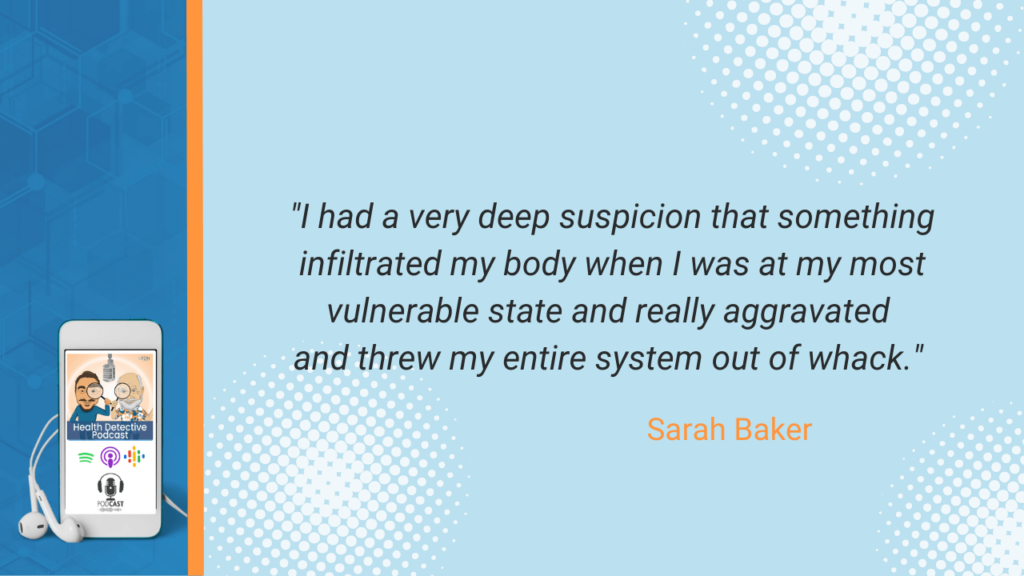
[00:16:48] Sarah Baker: Yeah, I knew 100% it was an accumulation of something. I had a very deep suspicion that something infiltrated my body when I was at my most vulnerable state and really aggravated and threw my entire system out of whack. Because essentially every single system within my body was dysregulated.
I had extreme nervous system dysregulation. My whole digestive system was out of whack. All of my hormones were severely depleted. I knew this wasn’t just oh, pregnancy, right? Because I had my first child, and I sure was fine. I renourished myself after that first pregnancy and maintained my level of health between the first two pregnancies. I just knew that something external infiltrated my body to create this level of chaos.
Hashimoto’s and Digestive Issues: Having a Baby & Falling Behind
For me specifically, it wasn’t necessarily lifestyle related. I will say though, a lot of my lifestyle choices right before the epicenter of my health crisis happened, I was making poor lifestyle choices.
Because we moved two weeks after I gave birth, obviously, my stress levels are peaked out. We were ordering a lot of takeout to get by, so, of course, I wasn’t eating how I normally would eat. I wasn’t supporting myself from a nutritional level as I could, 100%.
Too soon, I tried to throw myself back into work, so I was adding a lot of emotional and mental stress on myself when I was already dealing with severe sleep deprivation. When I should have been taking a step back and trying to figure out, okay, I don’t feel okay, let me pause my life, I was trying to go, go, go.
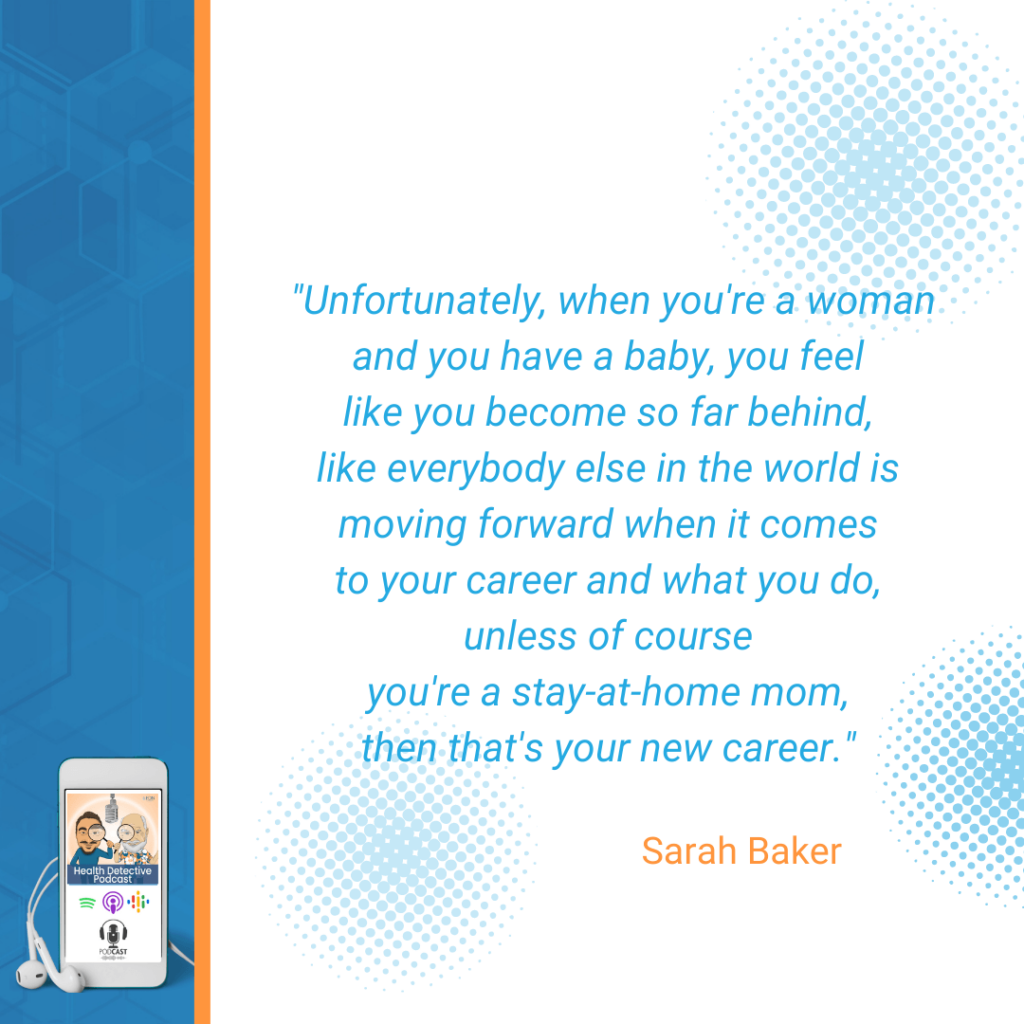
Unfortunately, when you’re a woman and you have a baby, you feel like you become so far behind, like everybody else in the world is moving forward when it comes to your career and what you do, unless of course you’re a stay-at-home mom, then that’s your new career. That’s a whole other type of career.
But it’s really unfortunate that when you give birth, you feel like you have to kind of reenter your career path, whether that’s working for yourself or working for somebody else within three months so that you don’t feel like you’re falling behind. That also is what contributed to all of my symptoms popping up all at once.
Hashimoto’s and Digestive Issues: The Jump to Functional
[00:19:14] Detective Ev: Yeah, we could do a million side topics. That’s kind of crazy in and of itself, right?
Like what does that do for the child’s development that we’ve created a world where the vast majority of people have to do exactly that, basically separate themselves for significant parts of the day from this being that they created that just came out of them. Probably, I don’t know that that’s the best thing to be doing, but we’re again, more or less forced into it. So, it’s a real kind of unique and interesting point just from even the health perspective of the baby, let alone the mom.
One thing, as well, we usually go into this a little deeper, but I think this is kind of clear today, so correct me if I’m wrong. I like to know how people made the jump into the functional side, but it sounds like based off your experiences with the modeling thing and just the last years prior to the second pregnancy, you seem very aware of the health stuff.

Even just this whole remineralization thing after pregnancy, like I haven’t heard of that. I’m sure maybe many of our female listeners have; I haven’t. Was it a big thing for you to go to like functional medicine or was that like a pretty quick transition after maybe you went to Western medicine first and they were like, hey, we don’t know what’s wrong?
How long did it take, I guess is what I’m trying to say from the symptoms to, okay, I’m going to a functional doctor that many people would look at as woowoo, even though we know it’s not?
Hashimoto’s and Digestive Issues: Save Time & Look Much Deeper
[00:20:22] Sarah Baker: For me personally, it didn’t take very long just because I’ve been working with other functional practitioners for the past decade.
Since I thought, I’m generally healthy, I’m first going to go to my OB/GYN and just get basic labs; see if everything’s okay. When I did that and all my labs came within the normal range, even though we all know what’s normal in conventional medicine when it comes to lab ranges isn’t actually optimal, I still knew something was wrong.
I immediately then dived deeper into more functional labs and full thyroid panels, right? Because when you go to your primary care provider or your OB/GYN, or even an endocrinologist, they will only test your TSH if you feel like you have something going on with your thyroid. They don’t test anything else, and they don’t even care that you have Hashimoto’s antibodies. They only want to know if it is so severe that it has impacted your entire thyroid.
Because of what I know, luckily, I was able to have access to functional medicine fairly shortly afterwards. But for the general population and for a lot of individuals and women that aren’t really aware of everything that functional medicine entails, it takes them going from multiple different doctors and multiple different specialists, more time of trial and error in trying to troubleshoot their own health until they finally make their way to somebody like myself or an FDNP.

At that point, they could have saved so much time if they could have accessed whatever labs they needed to from their primary care provider and then came straight away to a functional medicine practitioner or an alternative healthcare provider to really see what is going on in a much, much deeper level.
Hashimoto’s and Digestive Issues: A Little TSH Discussion
[00:22:05] Detective Ev: So true. Autoimmunity, in general, just gets screwed over by Western medicine. But the thyroid one is particularly close to home for me. My mom had the same thing just with Graves’ disease. They didn’t test the thyroid at all for like six, seven years.
For better or worse, the Hashimoto’s/hypothyroidism thing is more common. You might have more doctors that’ll be like that kind of sounds like this or sounds like that. Whether they test properly for it is a whole separate thing. But my mom, since she had the symptoms of hyperthyroidism, it was so easily written off to just stress or it’s in your head.
She’s getting put on anti-anxiety meds, but that wasn’t the case. I mean, this woman had severe antibody development. She had Graves’ disease. Her TSH, for those listening that have always probably heard it the opposite way, I think was like, zero point something. It was very low because there’s like this inverse relationship with the TSH. You know, when someone’s actually underactive, it’s super high.
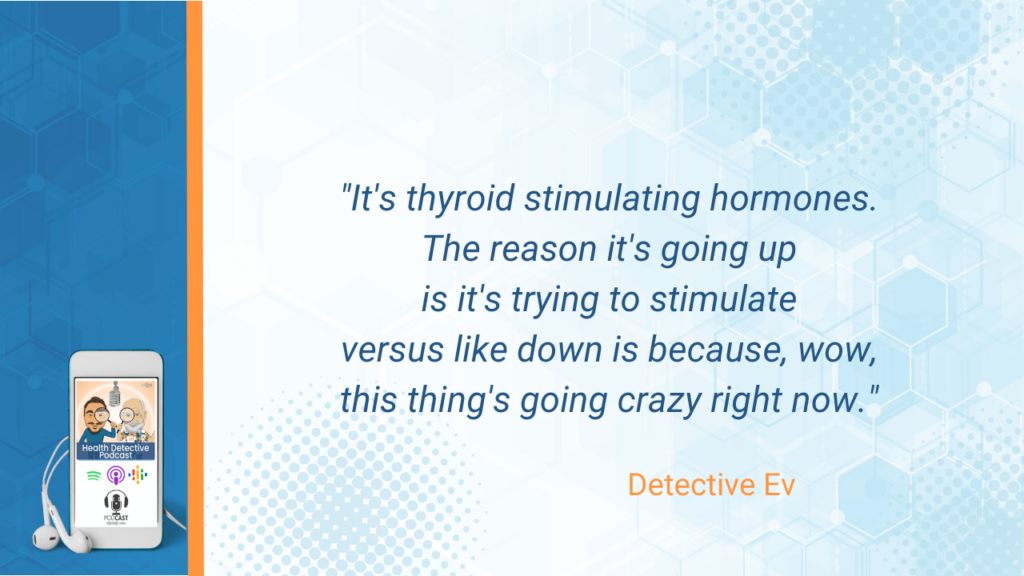
I think the easiest way to get people to remember that is, well, what is it? It’s thyroid stimulating hormones. The reason it’s going up is it’s trying to stimulate versus like down is because, wow, this thing’s going crazy right now. My mom’s sitting there with 130 beat per minute heart rate while she’s sitting on the couch or something. It’s crazy and I’m just glad that there’s people like us out there and like you out there getting to help these individuals.
I wanted to ask when you decided to make this your career, but it sounds more like this was an add-on to the things that you were already doing. You were already serving people in a health sense.
Hashimoto’s and Digestive Issues: Not Treating the Paperwork
[00:23:28] Sarah Baker: Yeah. I started my practice 10 years ago. But the one missing link for me was having the ability myself to order extensive functional labs.
One of my girlfriends, is also an FDNP. That’s how I kind of came upon you guys. She said, yeah, I can order all my own labs. I can run GI MAPs, do neurotransmitters, do like thyroid, all sorts of them. I said, what?
Because what I do is typically work collaboratively with naturopathic doctors, functional medicine doctors, and I fill in all the gaps. They pretty much will run labs and create a supplement protocol on their perspective, then I fill in everything else. Over the many years of doing this, I have learned how to read all of these labs.
But the one problem I’ve been finding is that I don’t always necessarily agree with other doctors of how they’re approaching the labs. What I’ve noticed when you go to a ND or another type of functional medicine practitioner, a lot of times they will just treat the lab results. If they see you have low iodine; take some iodine. Or you have low testosterone and low estrogen; just take some DHEA and don’t really do anything beyond that.
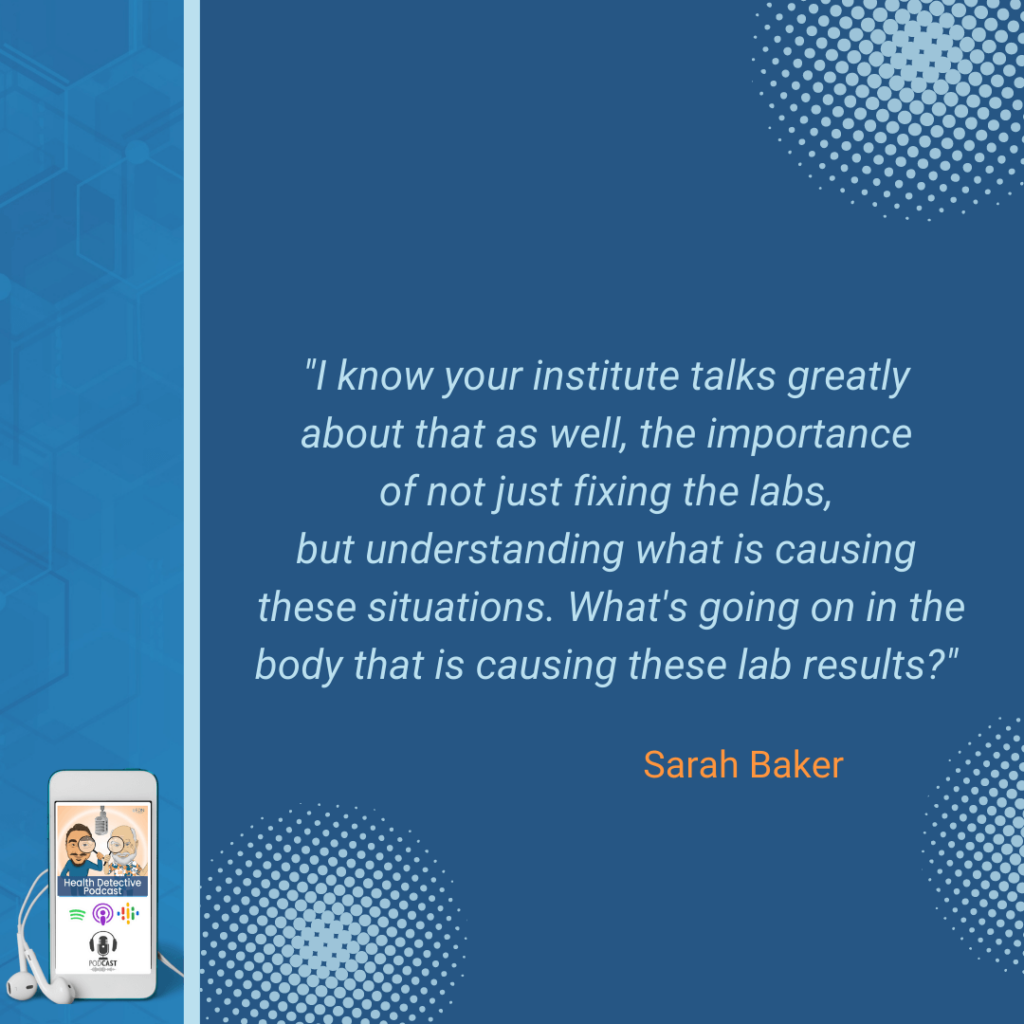
I know your institute talks greatly about that as well, the importance of not just fixing the labs, but understanding what is causing these situations. What’s going on in the body that is causing these lab results? That’s why I was really excited about this institute. Cause now I have the opportunity to run my own labs, create my own protocols, and do everything that kind of completes the practice that I’ve already established.
Hashimoto’s and Digestive Issues: A Time & Place for Supplementation
[00:25:33] Detective Ev: Sarah, I really appreciate you bringing this up. I hope everyone looks at me as like a genuine person. But you know, I’ve been through FDN so long ago that they look at me as like, an employee. Like, he’s just saying this cause he works for the place and that’s not the case.
But it’s nice to hear this from someone who has been in the industry for a while. You are actively going through the course. This isn’t something that, again, you get something for, or you’ve been doing for a few years. You’re even recognizing the clear problems right now with functional and natural medicine.
We know not all practitioners are like this. Sarah said that too, it’s not everyone. But a lot of the functional and natural medicine stuff basically becomes Western medicine with supplements and no surgery. That’s really what this is.

There is clearly a time and place for supplementation. We pride ourselves in being one of the best schools for teaching appropriate supplementation, so we’re all for that. But it’s this idea that that’s all you’re going to do. We’ll run the hormone panel. This is high, this is low. We treat it with a supplement. Again, conceptually speaking, how is that any different than Western medicine? Except maybe it’s a little safer because they’re not going on a medication.
You are no more deficient in X, Y, Z supplement than you are in X, Y, Z medication, generally speaking. Obviously, a supplement could be a vitamin, and someone could be deficient in vitamin A, for example. But with a lot of these supplements, it’s not that you’re actually deficient in them, it’s that they might be helpful for the time being.
Hashimoto’s and Digestive Issues: Root Cause Isn’t Necessary for Healing
So, the way that we utilize supplementation is we call it intelligent allopathy. Allopathy is this idea that we’re going to treat symptoms or diagnoses with drugs or surgery. Now, of course, we don’t treat anything specifically, but we can also make someone feel better. That’s why it’s intelligent allopathy. We’re not hurting them and we’re also trying to get to the bottom of what’s going on.

The idea of the FDN system is it’s designed in such a way that you can kind of help the person whether or not you ever really figure out what was that one specific root cause. I mean, Sarah, you work with people probably all the time that have been sick for a decade. The idea that we’re going to tell these people a hundred percent of the time that we know their root cause, I mean, yes, we’re getting closer than most people, but you might not never know if it was the gluten sensitivity or the trauma as a kid or whatever by the time you come to us with a decade worth of health symptoms. We could still help you regardless.
So, when did you actually start the course? I didn’t ask that.
[00:27:38] Sarah Baker: Oh, my goodness. Literally like, a week and a half ago.
[00:27:42] Detective Ev: Okay, cool. So, you’re fresh into it. If I may, I’d love to have you back on then once you graduate, maybe give it a few months and just see how this is working in your practice.
Hashimoto’s and Digestive Issues: Why Not Get the Training?
You also mentioned this idea that it’s kind of hard-to-get labs consistently unless you have these credentials. It’s one of the things that FDNs have the privilege of. This is a very dramatic example, but unfortunately, I can’t think of anything else off the top of my head.
When I was on the course enrollment side of things, I was talking to people if they were interested in enrolling in FDN. One group of women called, there were three women, and they were health coaches. Now, they went and worked under a doctor, and the doctor passed away in an accident. Their entire business, overnight, was like completely screwed because he was the one that facilitated the lab orders. They didn’t have any other connections for this, and they didn’t have anything. So, they literally all went through FDN super-fast because of this.
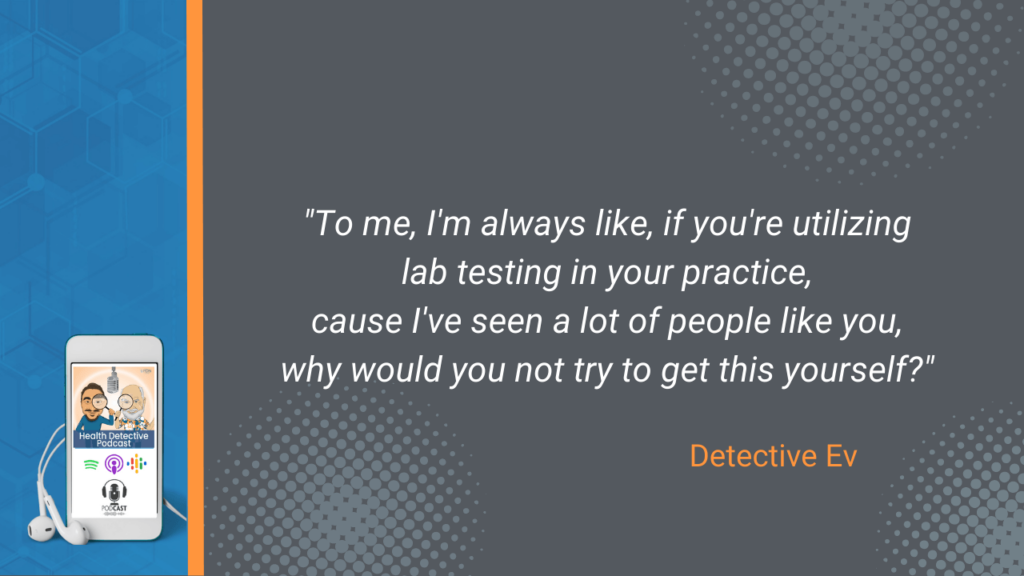
Again, I don’t mean to fear monger, that’s just the only example I can think of off the top of my head. But it was a real thing, and they were stuck in their business. To me, I’m always like, if you’re utilizing lab testing in your practice, cause I’ve seen a lot of people like you, why would you not try to get this yourself? Then you get the additional training, you get to see it from a whole different perspective.
So, in terms of how you work with people now, I mean, you’re fresh to FDN, so were you already in this mindset then of, hey, I’m not just going to treat the paperwork. How did you figure that out then without some type of course? Where did you learn that maybe it’s not just as simple as treating the paperwork?
Hashimoto’s and Digestive Issues: Data Only Isn’t Helpful
[00:29:05] Sarah Baker: It was very innate to me just because I’ve been doing this for so long. I speak with clients very extensively about their history, what’s going on right now. I dive deep into every area of their life.
Also, just by working collaboratively with doctors throughout the past 10 years, I would see firsthand how doctors would prescribe 20 supplements. I would try to support from nutrition, lifestyle, at home therapies, everything else that would entail within a program. They would be taking all these supplements and sometimes would be feeling worse because of the supplements.
Especially with DHEA, if you’re taking that, that could increase any of your hormones essentially. It can increase cortisol more so than estrogen or can increase testosterone too much. If you’re not doing it carefully, it could just make you feel worse.
Just pretty much from experience, realizing that certain supplements would not be good for a client. One example is I had a client who had extreme anxiety and a lot of mood disorders and some issues sleeping. We ran a lab that’s really similar to the Fluids IQ that looked at the DHEA to Cortisol ratio and whatnot.
One of the doctors that I used to work with wanted to give her a supplement that had Rhodiola in it. I knew that Rhodiola could be very simulating. In that doctor’s protocol it said to take it twice a day, one at morning, one at night. She took that supplement at night and was up all night because she already has that hyper vigilance and anxiety that she’s dealing with.

I’ve had so many situations similar to that, where physicians are relying just on supplementation based on only the data they see and nothing else.
Hashimoto’s and Digestive Issues: The Art of Intuition
They’re not listening to the person, not listening to their circumstances, not thoroughly absorbing what’s going on in their life, what’s causing certain stress triggers. How are they coping with stress and what are their circumstances? What are you eating, how are you sleeping? What are you doing every day?
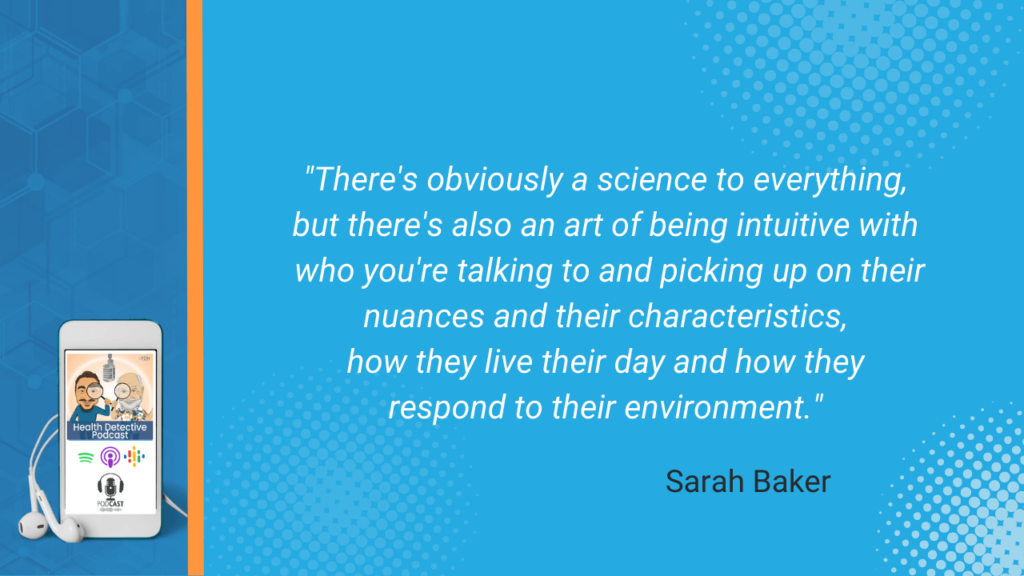
When you just lead with supplementation and nothing else, you don’t intuitively, like I kind of view it almost as an art, right? There’s obviously a science to everything, but there’s also an art of being intuitive with who you’re talking to and picking up on their nuances and their characteristics, how they live their day and how they respond to their environment. Which plays a very, very large role in the type of program a practitioner would want to create for them. That is much more than just supplementation.
[00:31:51] Detective Ev: Yeah. I think the only time I’ve heard this described as an art is by the mentor I had when I went through the FDN course, Brandon Molle. Brandon’s been doing this for 10 years.
So, just a little hint for the audience out there, two veterans consider this an art. And this matters, because FDN is a system and it’s predictable and that’s great, but there’s other sides to this.
I’m not an expert coach by any means. I went through FDN, I’ve always worked with clients to some degree. Personally, just for me, I don’t know if it’s my personality or whatever, but I have always found this idea of working 40 hours a week with clients, absolutely overwhelming. So, I’ve always mixed it in with other things. Then others, they’re like, send me 60 hours a week of clients, I could do this all day. Everyone’s a little different with that.
Hashimoto’s and Digestive Issues: Always Consider Bio-Individuality

But even myself, I’ve picked up that the word is, an “art”. It’s not just you get 1, so you plug in A, it’s not like a formula like that always. And if you’re doing it like that, I’d be a little hesitant because eventually that’s not going to work on every single person because we’re all bio individuals and there’s very unique circumstances that lead to us having health challenges.
I’m just impressed. I mean, again, I know that you have the clinical experience, but still coming to these realizations, I don’t think I ever would’ve done that. Before FDN I was looking for this diet, for this thing, this supplement for that, that was my own healing journey. Then this opened up my mind completely.
I know that you already probably have a good idea of what FDN is since your friend has gone through it and since you chose to purchase it. But I, really do believe that you’re just going to continue to love it more and more as you go through based on what you just said. So, it’ll be fun. It’ll be great to be able to talk to you afterwards.
How do you work with people as of now? Obviously, you’re still utilizing some labs and stuff. This episode will be released long before you actually finish FDN, and it sounds to me like you have plenty to offer people. Guys, we’re not like a cult here, right? You can work with someone who’s not an FDN even if they’re becoming one.
So, if I was someone who’s sick, like, how would I come to you? You can even talk about too, like what is the stereotypical type of person that would come to you?
Hashimoto’s and Digestive Issues: Helping with Women’s Issues
[00:33:46] Sarah Baker: Yeah. So, I have a naturopathic doctor that’s at my practice. I love her, she’s incredible. She is the gal that orders all the labs for all my clients since I cannot, yet. She also is very, very deep within the functional health world.
When clients come to us, we see primarily women. We see a lot of women who are trying to get pregnant. We see a lot of women who are pregnant because they’re having a lot of symptoms and they’re doctor is only doing so much.
I, personally, see a lot of moms who experience health issues after having kids. That could be from postpartum period all the way up to your child as a teenager. Cause sometimes when your body experiences a big shift in hormones after delivering a baby or whatever kind of falls out of balance after you give birth, and it doesn’t go back into balance, the body tries to deal with and function with the cards that it’s been dealt. It just kind of carries on with a lot of imbalances.
You may feel okay because you’re compensating for what’s going on within your body. But then after a while, the messages, via little subtle symptoms that your body’s trying to give you, eventually turn into very loud messages via very extreme symptoms.
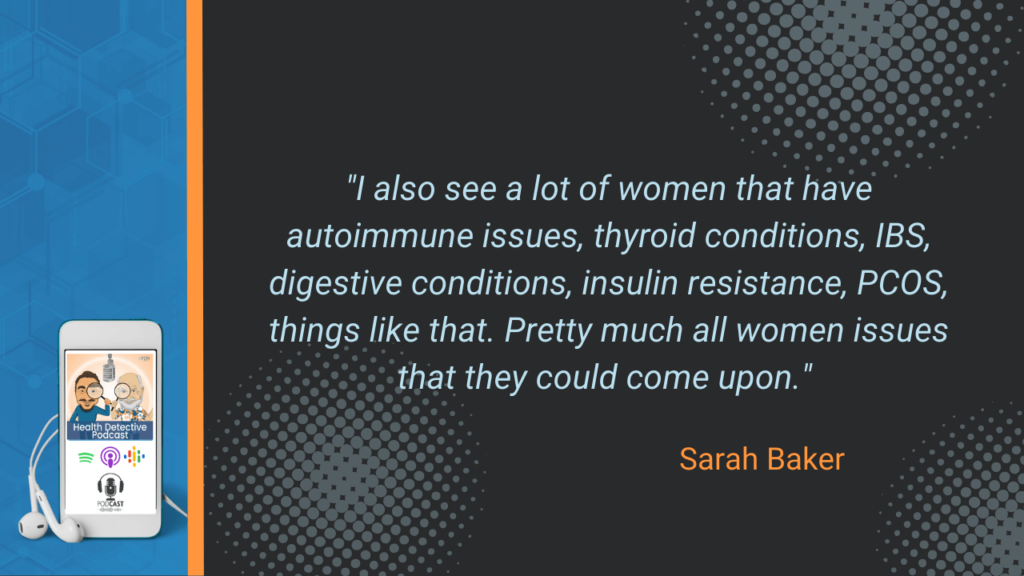
I also see a lot of women that have autoimmune issues, thyroid conditions, IBS, digestive conditions, insulin resistance, PCOS, things like that. Pretty much all women issues that they could come upon. And of course, more complex cases like mold and Lyme as well, we see that as well.
Hashimoto’s and Digestive Issues: Not Wasting Any Time
Typically, clients would come to us, they would meet with both of us. They would have an initial with the naturopathic doctor and then they would also have an initial with myself because I am able to, after all the years of doing this, I’m able to create personalized nutrition, lifestyle, at home therapy protocols for clients based on just a conversation before we see the lab work. I’m able to gather so much data as far as their eating habits, what they’re eating, what they’re not eating, how they’re living their life, that I can tell right away very important shifts that can help them as they’re waiting for labs.
People probably don’t realize this, but if you go and you see just like a traditional functional medicine doctor and they don’t really have anybody else at their practice, maybe they have nurses and whatnot, you have your initial appointment, you get your labs, and then you don’t have your next steps for you until maybe a month later. That month time period of waiting for labs to come back and then you have to set up an appointment to review the labs, and then you’re just put on like a supplement protocol, that’s very stressful. You’re sitting there waiting to make some improvements or to get some answers.

We kind of bridge that gap by creating kind of a foundational shift that they can make while they’re waiting for labs. Then Dr. Galino, she’s my ND right now, and then myself, we have two follow-up appointments where we both go over the labs and provide different perspectives. Then everything from there is very personalized based on each person’s circumstances.
Hashimoto’s and Digestive Issues: Make Use of Others’ Expertise
[00:36:49] Detective Ev: This is excellent. So as of right now, at the very least, if I come and work with your practice, I’m getting both of you on and off?
[00:36:56] Sarah Baker: Yeah. We’re like a bundled package.
[00:36:58] Detective Ev: Nice. But that’s really cool. I think one of the things that people that might not be in our world don’t realize is like, Dude, you can be really good at this, but there is constantly new science, especially in the world of functional. I mean, that happens in all of medicine I suppose but especially in the world of functional. There’s new science, there’s new things out there.
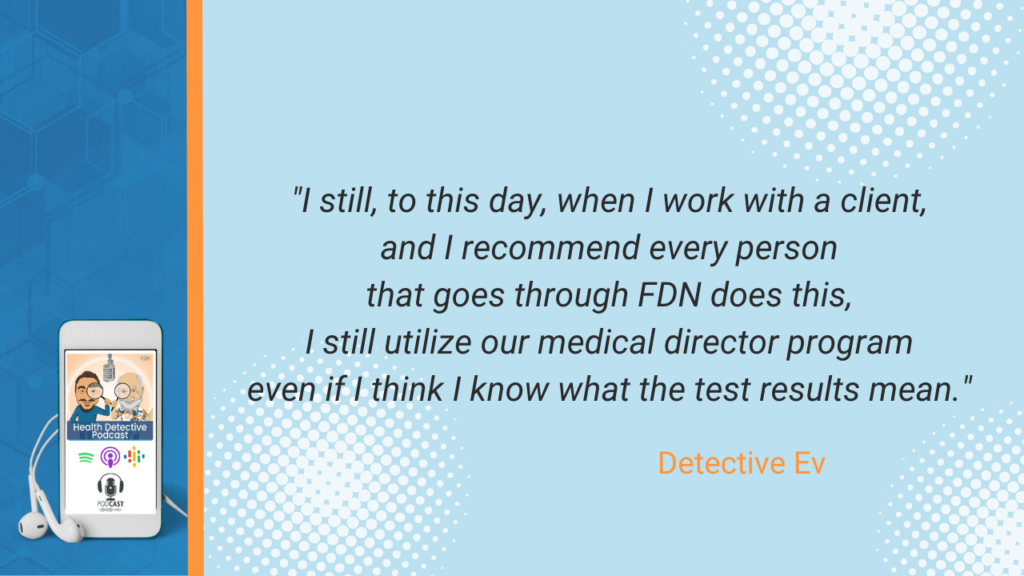
I still, to this day, when I work with a client, and I recommend every person that goes through FDN does this, I still utilize our medical director program even if I think I know what the test results mean. I’m like, why would I not go talk to someone who’s been doing this double the triple the time of me or been alive double the time I’ve been alive and has looked at thousands of labs where I’ve only looked at maybe, you know, 100 to 200. That’s probably actually an underestimate, but still hundreds to thousands. That just makes sense.
I really think you’re probably doing a huge service to your clients by being able to have two sets of eyes that have their both unique experiences in education. You don’t have to give examples, but are there times where you guys are like, oh no, we don’t really agree on something, and we want to go a specific way? Or are you pretty in sync at this point?
Hashimoto’s and Digestive Issues: Health Symptoms Reversed
[00:37:56] Sarah Baker: Sometimes. And we usually are really good at getting on the same page before we move forward with like different protocols or whatnot. Or I’ll provide like additional shifts on my end to compensate for another type of decision.
Again, that’s one of the reasons why I’m so excited about this program because I want to be able to offer my own labs to my clients and assess it myself and create the supplement protocol myself. I think that’s like one of the biggest values that FDN provides for nutritionist, nutrition therapy practitioners, health coaches, is that ability for you to have more control of how you run your practice and your coaching program and your business.
[00:38:42] Detective Ev: Yeah. I have a biz question for you, but I didn’t realize, I didn’t even ask this explicitly. I already know the answer, but it’s still cool to hear. It’s just inspiring for people. How are those health symptoms of yours doing nowadays?

[00:38:53] Sarah Baker: I’ve reversed my Hashimoto’s. All my hormones are back in good shape. No more digestive issues. The only thing I am working on now is just mold detox because we are unfortunately still in this house that has a mold issue.
We’re moving out in the next month. So, I’m trying to mitigate the mold symptoms as much as possible while we’re here. Then I’m planning on doing like a hardcore mold detox once we’ve moved. One interesting thing that I’m going to be adding to my list once I’m in a very clean environment is ozone therapy. I’m really excited to try that.
Hashimoto’s and Digestive Issues: Prevalent Mold Issues
[00:39:28] Detective Ev: Cool. I feel like I’m the only functional practitioner nowadays that isn’t going through some type of mold situation. I don’t know if ignorance is just bliss or what. No, I’m kind of kidding.
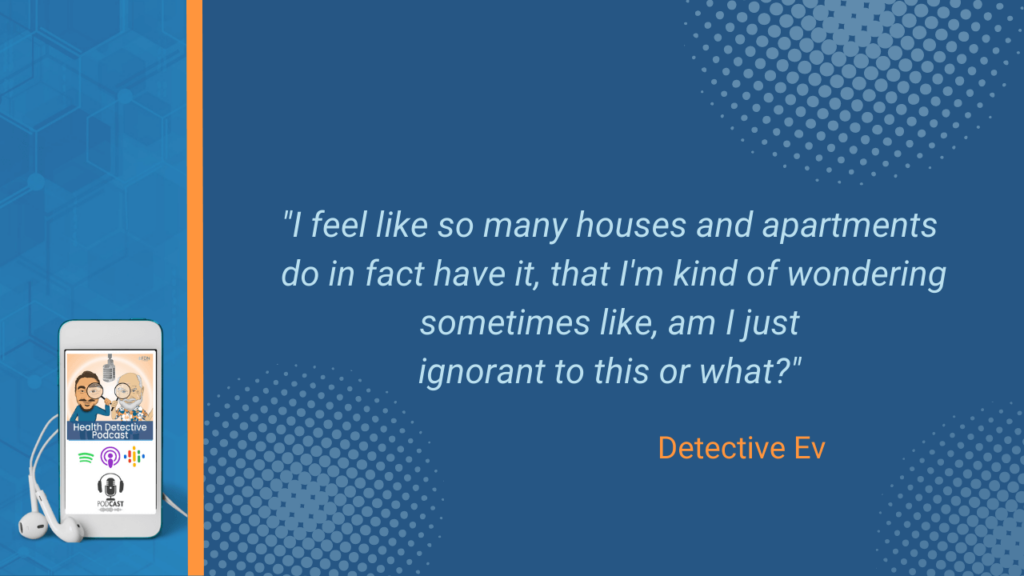
But you know, there’s such an awareness in our space. I feel like so many houses and apartments do in fact have it, that I’m kind of wondering sometimes like, am I just ignorant to this or what? There are people that I really respect their mindset and really respect their knowledge, they come on and like, everything’s going well but that’s one thing that they’re working through.
This is not a solution, I don’t mean to oversimplify this, but I’m someone, I’m always outside. I always have my windows open when I drive and I drive like 40,000 miles, 50,000 miles a year. I’m outside most of the time anyway. My windows are open at home, even in the cold. I’ve always just liked that. Again, not a cure-all for mold, don’t use that as medical advice. It’s certainly better than sitting in it all day and not getting any fresh air.
So, my biz question for you, if I may. You know, you’re so established at this point, you’re like living the dream of so many of our practitioners. Because again, for me, like I’m not someone who wants to work with clients all the time, I like mixing that in. I think it’s one of my purposes here, but it’s not my only purpose all the time.
Business Talk: Establish a Specific Problem You Want to Solve
A lot of the people that listen to this show and watch this, they want to do this. They want to do exactly what you’re doing. And some of them are really scared. We can give them all the knowledge in the world, their health issues can get better, and yet for some reason they still walk around with a lack of confidence.
May I ask, what advice would you maybe give to someone just starting off their business in the health side of things? What do they need to know? Especially women because a lot of the times, I feel like it is the women coming to me that say like, I don’t know how to do this. I don’t feel like I’m worthy. I’m like, you’re awesome, you definitely can do this. I think they’d rather hear it from you.
[00:40:55] Sarah Baker: Evan, you just opened up a whole can of worms because I don’t think you know this, but I also have a marketing firm business that is geared strictly towards health practices and health professionals. That has been my side business that I’ve also had for eight years. This is another passion of mine.
When you’re just starting off as a health coach or health practitioner or whatnot, you want to first establish who you want to serve and maybe a specific problem you want to solve.

Sometimes when everybody has so many ideas, and so many issues that they want to help resolve, it’s like throwing so many balls against the wall and all those balls just kind of bounce back. I always recommend that you zero in and focus on one problem that you want to kind of present as you break out into this industry as you’re first starting out.
Business Talk: What Have You Resolved in Yourself?
Sometimes when we act a little too vague, our messaging, when it comes from a marketing perspective, can become diluted and we’re not attracting a lot of sales. Because we want to attract our dream client, the client that has the exact type of health issues that we want to help address. Of course, another way to go about it is, I help people get to the root cause of their symptoms. But still, everybody essentially does that.
So, you want to think, how can I position myself in a way that separates me from everybody else? That takes you to step two. The second question you want to ask yourself, what have I resolved in myself? Because, you said it Evan, a lot of people that are going through FDN also have a health challenge that they are currently healing or have overcome.
You want to walk the talk; you want to be able to give your personal story and be able to resonate with who you are speaking to. Whether that’s, you know, I specialize in helping women with their metabolism; I specialize in helping women with their hormones; I specialize with thyroid.
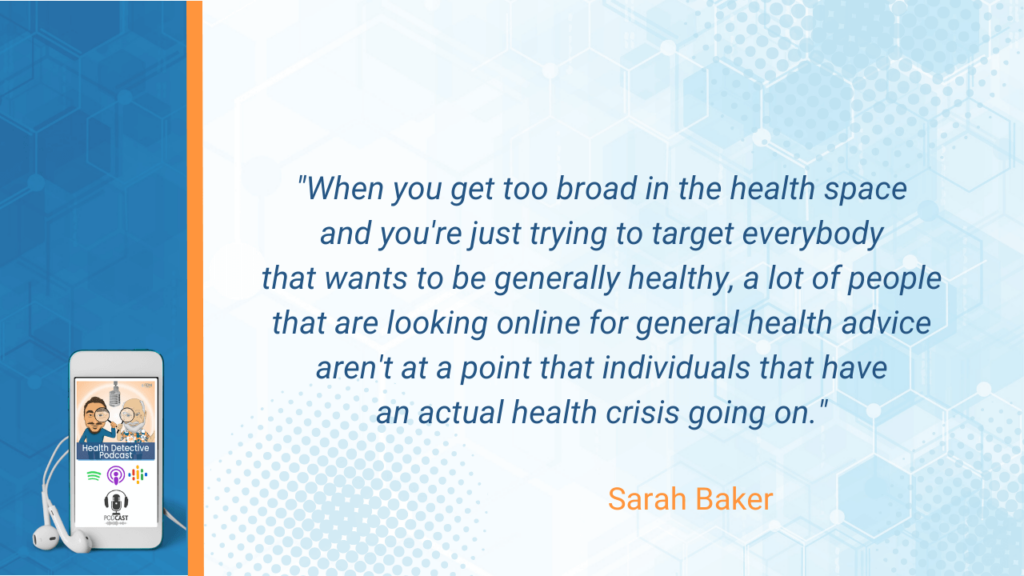
That doesn’t mean you’re pigeonholing yourself in one topic and you’re just going to be the thyroid health coach forever. You want to launch yourself with something specific so that you are attracting your exact type of client. When you get too broad in the health space and you’re just trying to target everybody that wants to be generally healthy, a lot of people that are looking online for general health advice aren’t at a point that individuals that have an actual health crisis going on. They’re not in a circumstance where they are actively looking for a practitioner to help them.
Business Talk: General Health Issues Won’t Get Them Over the Line
Because when you get to the point when you are looking for a functional health practitioner or coach, you have kind of exhausted all other options and you need help. So, if you’re going to just be a general health coach, I’m going to help you with your symptoms. You know, Cheryl down the street just has like some bloating after she eats, but not much. You’re attracting a bunch of Cheryl’s that have some symptoms but not enough that causes them to take action. Then you aren’t going to be growing your business as well as you should be.
I guess that’s my two reflective questions you want to ask yourself when you’re first starting off.
[00:44:03] Detective Ev: I love it. Thank you.
I like the spiel because I’m not an expert marketer, but I’ve learned a lot over the last couple of years of doing the FDN podcast because they’ve taught me a bunch of stuff on the marketing team.

Actually, I really like the way that you package that, cause I’ve heard the whole thing of like make sure you’re talking to someone. I just thought it was cool that you’re basically describing it as like, think about what’s going to happen if someone has just general health issues and they’re online, that’s not going to actually put them over the line.
The way I always tell it to people, I’m like, because it made so much sense to me when I heard it, although I wasn’t applying it prior to that, I’m like, duh, there’s like 7 billion people in the world, a billion plus are online actively. I’m sure there’s some people that have acne, cause that’s, you know, my thing. I’m sure there’s some people that have mental health issues.
Business Talk: Be Specific & Talk to SomeONE
People get so they think they’re pigeonholing themselves by creating content only for that person. But look at your business. You even said yourself, you work with other types of people.
I wish I could put this in every practitioner’s head. Just because your niche is acne does not mean you are not allowed to work with someone who has GI issues. FDNs don’t even treat anything specifically. This is business stuff. So, if someone comes to you for that, you’re more than welcome to intake them and work with them. No one has to know that. It’s who are you creating the content for?
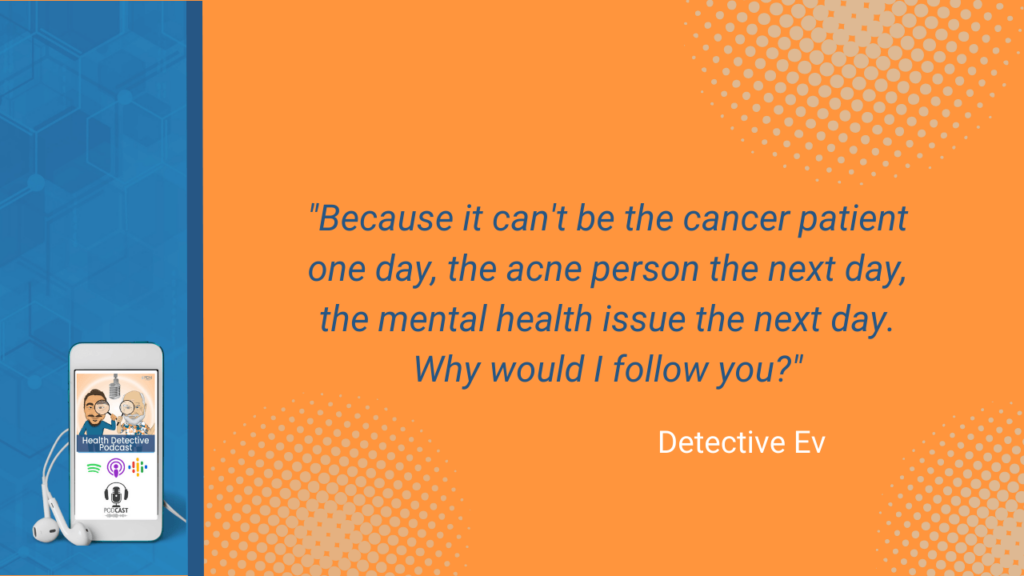
Because it can’t be the cancer patient one day, the acne person the next day, the mental health issue the next day. Why would I follow you? I already got like a thousand accounts that are pissing me off online. You’re just confusing me now. I want to know that you’re going to bring me value every day and that you know about me and my conditions. So, great advice. Awesome.
Where to Find Sarah Baker
We’re coming up towards the end of our time here. I’d love to be able to shout out your businesses, not only the health side. I did not know about the marketing one, but just the fact that you’ve been doing that for eight years and have had the success you’ve had in the health stuff, I know enough to know that you’re having success with that. Many of our practitioners could benefit from this. So please shout out both, where can people find it?

[00:45:43] Sarah Baker: Yeah. On Instagram, you could find me at sarahbakerhealth, Sarah with an h. My personal website is sarahnicolebaker.com.
My marketing firm, the website’s currently under construction, but it’s just Baker pr. But I have grown that primarily from word of mouth. All clients just kind of send me to other clients.
So, I would say if you are looking to fix your health or you’re another practitioner, you want some guidance on how to start or grow your business, come to Instagram, sarahbakerhealth.
[00:46:14] Detective Ev: Very cool.
My final question for you, which I think you already know what I’m going to ask. If I could give Sarah, in this case, a magic wand and you could get every person in this world to do one thing for their health, (so, now we talked about business, we’ll talk about health), if you could get them to either stop doing one thing or start doing one thing, you could pick either, what is the one thing that Sarah would get them to do?
Signature Podcast Question
[00:46:32] Sarah Baker: Number one thing is to optimize your sleep.
I know firsthand how if you’re eating well, you’re working out, you’re trying to regulate your nervous system with stress management techniques, but you’re not sleeping well, you are going to create a huge roadblock on your healing journey. Because if you have insomnia or you’re waking up multiple times throughout the night, or you wake up early in the morning, you can’t get back to sleep.
When you sleep is when your body is healing like regeneratively restoring. Your human growth hormone spikes up the first few hours of when you’re sleeping. I mean, you need that time for your body to actively repair cells, get rid of damaged cells, to repair the liver, to really go through your entire body and heal it.

So, if you have a health challenge, and your sleep is still struggling, I tell every single client, first, we want to establish your sleep again, healthy sleep, and then we can target everything else.
How can we make that actionable? You want to kind of set your circadian rhythm, you know, make sure you see sunlight 20 minutes within waking up. I always tell people to work out earlier in the day versus later in the day.
Then we all know all the commonsense ones, like, no screens two hours before bed, blue blocker glasses, keep the room cool, blah, blah, blah. But really doing whatever you can to prioritize fixing any sleep issues first. That should be the number one priority whenever you’re on a healing journey.
Conclusion
[00:48:04] Detective Ev: Love it. Sarah, thank you so much for coming on today and just congrats on becoming an FDN. I’m excited to talk to you on the other side of your journey.
[00:48:11] Sarah Baker: Yeah, I’m going to be really excited too. Thank you so much, Evan.
You can always visit us at functionaldiagnosticnutrition.com.
To hire an FDN Practitioner, go to fdnthrive.com.
For a FREE eBook, go to fdnthrive.com/steps/.







